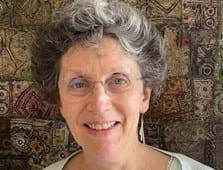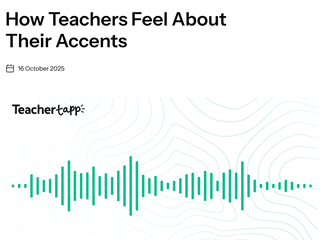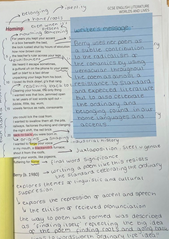Over many years, and increasingly often in recent times, we’ve had teachers come to us asking what they can do about their SLT who have limited understanding of how English works as a subject, and are expecting certain things of them that don’t seem appropriate. Often, it seems to be SLT members who are not English teachers who don’t recognise subject differences and how a generic, standardised imposition of ‘the science of learning’ may not suit the discipline of English and end up damaging rather than supporting learning in the subject.
The concerns generally fall into these categories;
- what constitutes knowledge, and the treatment of knowledge in English as if it’s just the same as knowledge in Science, Maths, PE or Geography
- the role and importance of memory and memorisation within disciplinary study, with an emphasis on limited factual recall, and the regular testing of that
- the distinction between ‘novice’ and ‘expert’ in subject learning and how that connects with ideas about gaps, deficits, disadvantage, as if this operates in exactly the same ways across subjects
- the question of whether an English curriculum can be constructed as a hierarchical, structure, where small elements build sequentially upon one another or whether it is more messy, more of an elaborate patchwork, rather than bricks in a building
- the question of whether ‘bought-in’ schemes of work or whole curricula can offer the best opportunities for teachers to construct a meaningful curriculum for their students, in their own particular context
- the imposition of classroom ‘routines’ that suck the life out of English and restrict opportunities for a more flexible and ‘creative’ approach to learning in the subject
- restrictions placed on the use of talk in the classrooms, particularly unstructured talk for learning (something that, hopefully, will be addressed by the recent renewed interest in oracy)
- unwieldly, time-consuming internal assessment regimes, purporting to be formative but actually more like something to be ‘endured’ by both teachers and students, to meet whole-school demands
- a loss of agency, that means that teachers lose heart, feeling disconnected from their own experience of the subject at school and degree-level and finding themselves doubting their own expertise.
It is not unusual for teachers on CPD courses to say, ‘I’d love to do the things you’ve offered us today – I know how valuable they are – but I’ll go back into school and I won’t be allowed to teach in this way.’ Recently, working with a group of 50 teachers, one Head of Department came up to me at the end to ask for reassurance that she’s not ‘crazy’, that her feelings of frustration are not ‘stupid’, that she’s been right to be resisting some of the pressures being put on her and her department. She had a very good English degree from a very good university and yet she had been made to feel deeply insecure and uncertain about her own subject knowledge and expertise, that was clearly far deeper than that of her SLT.
Teachers in these circumstances often ask us, ‘what do you advise me to do? How can I hold firm, or resist, or change the situation for my department, in my school?’
It’s not easy. Each school and every context is different. Often it also comes down to relationships, longevity and status in a school – as well as results, which give a Head of Department more or less leverage. Despite these caveats, here we try to offer a few small suggestions – a few ways of trying to explain what’s at stake and what matters to SLT who either lack awareness of the subject, or have been slow to listen to concerns.
1. Direct SLT to experts
Draw their attention to the work of highly respected and reputable educationalists, both in English Studies and in the world of education, who are arguing strongly for the need for subject differences to be at the heart of thinking about curriculum and pedagogy.
Two people worth pointing out might be:
Christine Counsell
A highly regarded figure in History teaching who has also done a lot of very well respected work across the curriculum, in primary and secondary.
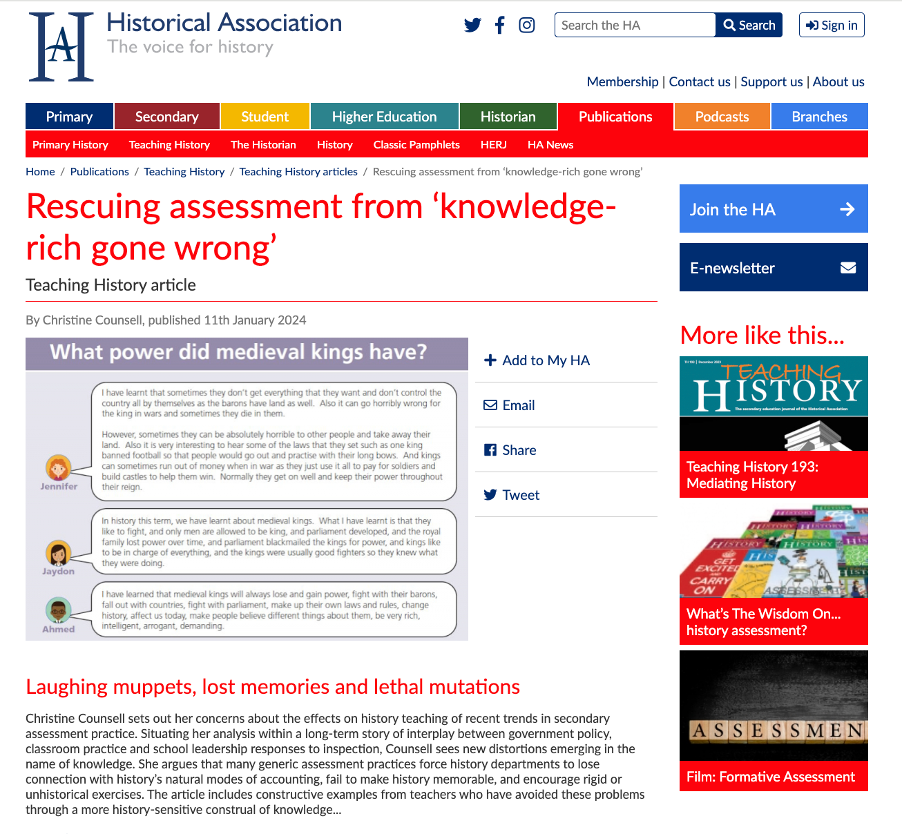
Professor Robert Eaglestone
His important work on English as a subject discipline makes very clear the ways in which English is a subject based on ‘dissensus’ not ‘consensus’, where the questions we are trying to answer are not designed to elicit ‘facts’ or ‘truths’ in the same way as, for instance, Science. His pamphlet on this subject for Impact, is an excellent short account of the issues.
You could give your SLT a sense of the discussion by showing them the overview of the pamphlet:
https://onlinelibrary.wiley.com/doi/full/10.1111/2048-416X.2020.12006.x
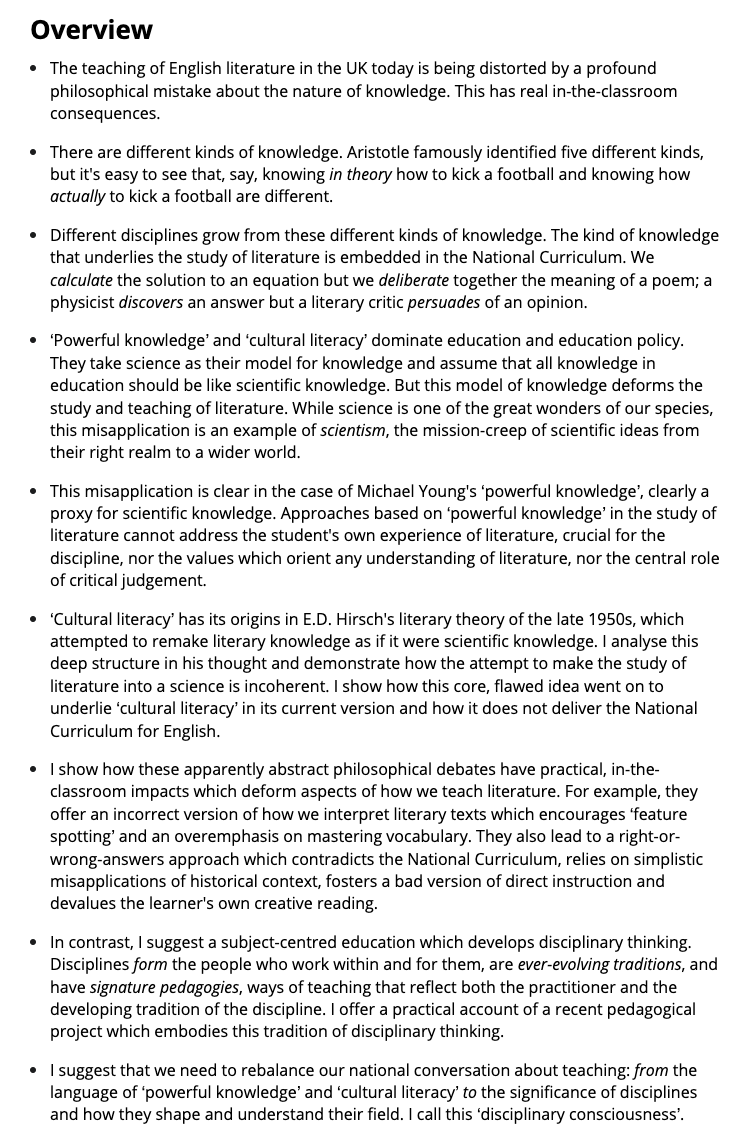
2. Direct SLT to representative bodies
Common English Forum, an umbrella group of organisations working in subject English from Early Years through to university-level English, has worked on a Manifesto for the subject, with many of the participating organisations having signed up to it.
https://englishassociation.ac.uk/a-manifesto-for-english-the-common-english-forum/
It includes many aspects of subject English that may be useful in fuelling debates in your Department and school. These sections, in particular, may be helpful in explaining what is distinctive about English and why both curriculum decisions and pedagogy need to be sensitive to what is special about it as a discipline.
English as a subject is distinctive in the way that it:
- crosses boundaries in being critical, affective, aesthetic, creative and analytical and has different strands – literary, linguistic, involving the production of texts as well as the reception and critical analysis of texts
- is non-hierarchical and non-sequential in the organisation of its knowledge – unlike some other subjects
- embraces indeterminacies and so has many different right as well as wrong answers
- is both a ‘servicing’ subject (teaching children how to read and write in ways that span all learning) and a subject in its own right – teaching ‘about’ language and literature.
School English should include:
- a focus on the central place of meaning in teaching reading and writing, situating lessons in authentic purposes for reading and writing and enabling pupils to understand why learning to read and write will be important in their lives
- learning about, and learning how to use, spoken language in multiple contexts, recognising its importance not only in children’s lives but also as the foundation of all learning.
- taught experiences that, in EY and KS1 and 2, develop children’s knowledge of phonemes and letters alongside their comprehension, and knowledge about writing
- opportunities for dialogic learning – ‘talk for learning’ – both with a teacher and with peers, to allow for exploration and development of personal response, interpretation and understanding of complexity and ambiguity
- textual encounters that go well beyond the literary, to include non-fiction, media texts, multi-modal texts and spoken texts as well as written ones
- opportunities to learn ‘about’ language, through exploring language in use, as well as using language opportunities to develop visual and media literacy and critical literacy skills to equip students for 21stcentury life
- a broad range of textual experiences including canonical and diverse texts, both contemporary and from the past. (Range is currently prescribed by the National Curriculum Programmes of Study but this should be revisited and re-inflected to include greater emphasis on reading for pleasure, picture books, Young Adult fiction and diverse, contemporary texts.)
English pedagogy in school settings should:
- recognise that English as a discipline is founded on social, creative and cultural practices, and in this sense differs from some other subject disciplines in the pedagogies required to teach it
- include dialogic episodes in classrooms, as a vital part of learning alongside teacher input
- be responsive to students’ cultures and interests, recognising the importance of students’ voices being heard in classrooms, drawing on, and showing respect for their own linguistic resources
- take note of insights from cognitive science but treat them with due care, judging with caution their applicability beyond experimental and laboratory settings and in relation to English as a subject discipline
- be decided by teachers and departments, allowing them to judge what is appropriate to their own contexts, intentions and students.
- avoid overly structuring and scaffolding learning, which much evidence suggests is neither in the interests of higher attaining nor lower attaining students.
3. Give SLT insight into actual practice
One way of doing this is to invite them to a department meeting where you demonstrate what English knowledge looks like and the ways in which it can be developed in a classroom context. This might be as brief as a 15-20 minute activity followed by discussion. For instance, at the meeting, you could share this poem.
“Hope” is the thing with feathers -
That perches in the soul -
And sings the tune without the words -
And never stops - at all -
And sweetest - in the Gale - is heard -
And sore must be the storm -
That could abash the little Bird
That kept so many warm -
I’ve heard it in the chillest land -
And on the strangest Sea -
Yet - never - in Extremity,
It asked a crumb - of me.
Ask everyone to do some/all of the following activities:
i. On your own first, think about some or all of these, then share:
- Which phrase/line do you like best?
- Which phrase/line do you think is the most important one in the poem?
- Look for oppositions in the poem e.g. sound/silence
- What do these reveal to you about the ideas and feelings expressed?
ii. Write a few sentences about the poem in an exploratory way, as if thinking aloud. Compare what you’ve written with someone else. Have you chosen to focus on the same things, in exactly the same way, or taken slightly different approaches and angles.
iii. Turn the poem over. Ask everyone to write down one or two phrases that they remember (aside from the first line). Did people remember the same ones? Does it matter if they’re different?
iv. Ask everyone to think about what the poem reminds them of. It could be something
- In their own experience
- In their reading experience (poetry or anything else)
v. Share thinking about what this reveals about subject English – the personal nature of every reader’s engagement with a text; the fact that there can be multiple ‘right’ answers; the way in which discussion and debate can open up more potential meanings; the fact that readers can, quite legitimately remember different things and draw on these different memories; the fact that writing about texts can have multiple valid starting-points; the fact that the subject depends on students having different ideas and voicing different views; the fact that no-one is wholly novice or wholly expert in an English classroom and that students will sometimes raise valid ideas that the teacher hasn’t previously considered; the fact that texts are never ‘mastered’ and that there will always be questions that remain unanswered, or that will be answered differently on a future encounter with the text.
4. Show SLT other ways of doing things
Share with your SLT the experiences and insights of other departments and of what you have learnt by meeting with others, for instance on CPD days, or conferences or via blogs and articles, such as those written by EMC. If your school is insisting on doing things one way, on the basis that this is the only way it can be done, then show them how others are successful in different ways.
If you came to EMC’s Assessment Conference in July, for instance, you will have heard accounts of English departments who have moved away from the practice of assessing by a formative and a summative assessment at the end of each unit, and have been discovering how beneficial this has been in terms of improvements in student writing as well as better forms of assessment. If you were unable to attend, you can read all about it in our blogs, and share this with your school management.
5. Talk to us!
EMC is happy, on a consultancy basis, and subject to our availability, to talk with you about your particular context and offer suggestions and reading to support you in getting across your vision of the subject in your school, helping you to argue for the kind of pedagogy and curriculum that you are committed to.
If others have ideas about ways in which they have worked with their SLT and argued for the subject and its disciplinarity, do feel free to send in comments at the end of this blog.

